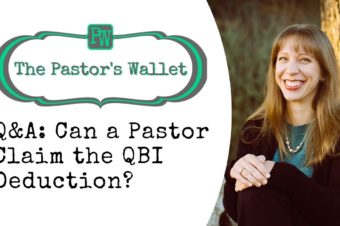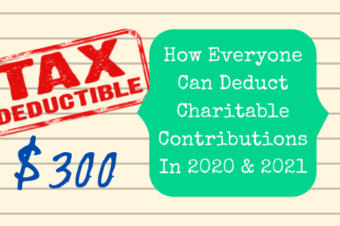This post breaks down all of the major types of income a pastor can earn and explains how the IRS treats them for Social Security, income tax, retirement plan and payroll tax purposes. It is based on IRS Publication 517.
Are Pastors Eligible for the Home Office Tax Deduction?
Like many all over the globe, pastors did a lot of work from home last year. Whether you already had a dedicated space or had to claim a corner of the dining room table, last year was the year of the home office. Does that mean you get to claim a home office deduction on your taxes?
I’m sorry to say, probably not. Some strict requirements must be met in order to claim the home office tax deduction, and the majority of pastors likely will not qualify.
Requirements to Claim the Home Office Tax Deduction
Self-Employed vs. Employee
The first rule, which knocks out almost everyone, is that employees cannot claim the home office tax deduction. Even if all of your work is always done from a home office. If you are an employee of a church or other organization, you cannot claim the deduction (even though you pay some taxes as if self-employed). The home office tax deduction is only available to the self-employed who file Schedule C (and some partners, but that doesn’t apply here).
Exclusive Use
In addition to being self-employed, you must use the office exclusively for business purposes. “Business” is the term that the IRS uses, but if you’re a pastor, you can substitute “ministry” and it means the same thing. Exclusive means that nothing else can go on in that home office. One hundred percent of the time that it is being used, it has to be used for business purposes.
This is the rule that knocks me out of the running. I am self-employed and have a home office. However, my kids love to read next to the heater in my office and I use my desk and computer in the office for personal things and to teach Financial Peace University classes through my church. Because we use my office for things other than my work, I cannot claim the home office deduction.
Regular Use
You also must use your office regularly. Even if it is set aside exclusively for your work as a pastor, if you only occasionally use the office, it does not qualify. Now, there isn’t a concrete line drawn between the “regular” and “occasional” use of an office that I can refer you to. The IRS would look at all of the facts and circumstances in making a determination. It isn’t usually a problem, though, because it’s usually one of the other requirements where people fall short, such as exclusive use.
Principal Place of Business
Finally, the home office must be your principal place of business. If you have an office in a church or something similar, then even if you regularly use your home office exclusively for ministry, it likely will not qualify. The home office must be the principal place of business. Of course, if you go elsewhere to perform wedding ceremonies and the like, that shouldn’t be a problem. You can perform ministerial services in other places, as long as your home office is your main office.
How to Calculate the Home Office Tax Deduction
Let’s say you’ve met all of the requirements. Maybe you do traveling ministry and work out of your home office that isn’t used for anything else. How do you actually claim the home office tax deduction?
The home office deduction is subtracted from your self-employment income on Schedule C. You can use the deduction to reduce your income down to $0, but it cannot create a loss (negative income).
There are two methods of calculating the actual deduction, the Regular Method and the Simplified Method. With the Regular Method, you divide expenses between direct and indirect expenses. Direct expenses are those that only apply to your home office, like installing blinds so you look better on Zoom. Indirect expenses are shared with the rest of the home, like electricity and mortgage payments. This graphic from financial planner Michael Kitces illustrates the difference well.
All of the direct expenses are included in the home office deduction and a proportion of the indirect expenses are included. You can calculate indirect expenses as a percentage of the home’s square footage or some other reasonable comparison. One important thing to note is that you must depreciate your home when you use this method, which can affect the taxation whenever you sell it.
If that sounds too complicated, then the Simplified Method is for you! And it really does live up to its name. Just take the square footage of your home office (but only up to 300 square feet) and multiply it by $5. There you have it, that’s your deduction. Simple, isn’t it?
How the Home Office Deduction Affects the Housing Allowance
This is an article for pastors wanting to claim the home office deduction, so we have to address the clergy housing allowance. Does claiming a home office deduction affect your housing allowance? Yes, it does.
The housing allowance provides you with a tax exemption for creating a home, not a business. As such, business use of your home is excluded. You don’t lose the entire housing allowance, just a proportional amount related to the business use of your home. This article explains it in more detail including how to do the calculations. Basically, you can’t double-dip. You can’t get tax-free housing and then deduct the expenses on your tax return again.
I’m sorry if you were planning on claiming a home office deduction this year and I dashed your hopes. Look on the bright side, though. You probably saved a lot of money on gas!








